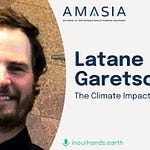In this episode, Ramanan speaks with Mark Stoll, a professor of environmental and religious history at Texas Tech University, where he also serves as director of Environmental Studies. This is our second episode with Mark that continues the conversation focused on his work with religion and the environment.
Stoll has written two books about the American environmental movement's significant formative religious influences: Protestantism, Capitalism, and Nature in America (1997) and Inherit the Holy Mountain: Religion and the Rise of American Environmentalism (2015). His newest book, Profit: An Environmental History, is an environmental history of capitalism and has been described by such figures as Bill McKibben and Katherine Hayhoe as a “must-read” outlining “the central tale of the human story.”
We discuss the relationship between religion and environmental movements, how political influences have shaped the opposition to environmentalism within certain religious groups, and the multicultural nature of contemporary environmental beliefs.
Episode 1 with Mark Stoll is available here.
Full transcript available by clicking above. This episode is also available on Apple Podcasts and Spotify.
In Our Hands is a production of Amasia. Follow these links for more about our firm, the Amasia blog, our climate fiction podcast, and Ramanan’s blog.
Highlights
[00:05:40] The Shift in Religious Views on Environmentalism
[00:08:25] Denominations and Consequences
[00:15:30] Denominations in Power
[00:24:30] Influence in a Secular Society












